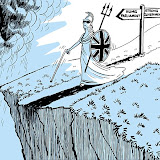Is it ironic, dramatic or downright farcical that in all this hullabaloo and with the two main parties completely at sea and in full panic mode, the AD can only* come up with a challenge regarding the boathouses at Armier? Throughout last Friday’s Xarabank Arnold Cassola seemed to...
Well Hung
posted by Jacques René Zammit
Why Cameron would love to be Maltese I cannot help wondering how David Cameron must wish that he was a Maltese politician. Rather than sitting at the negotiating table with that pesky Nick Clegg (the tiddler that he is) he’d be sitting firmly, decisively and stably at the head of some...
Hang On – UK e...
posted by Jacques René Zammit
It’s the last day before voting day and the three main parties in the UK have unleashed their last attempts to lure voters to their fold. Or should it be to scare voters away from their opponents’ fold? The Fear Factor, redolent of the Top Trumps Horror Series, has become a major...
Twits and Tweets
posted by Jacques René Zammit
JosephMuscatPL is Joseph Muscat’s twitter name. He has just tweeted the following: “Il-PL jaspira ghal separazzjoni bejn Stat u Knisja b’rispett reciproku”. (The Labour party aspires for a separation between State and Church with mutual respect). Why? Yes. That is my...

